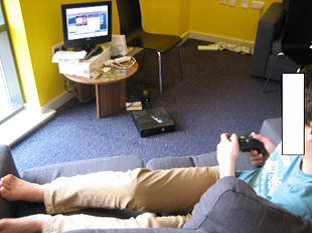
Go Sisyphus
Positive health and well-being of men living in poverty (October 2012 – August 2020)
Purpose
Men in poverty experience the lowest life expectancy and the worst health outcomes of any group in the UK. They are often stigmatised and blamed for their situation. The aim of this project is to discover, largely for the first time, the positive health and well-being such men experience and create.
Process
Participants were 21 White British men living in the North of England whose income is in the lowest quintile: that is, under £14,000 a year. Their ages range from 22-71 years. Thirteen live alone and the others live with their significant other, family, or friends. Nine men are unemployed, nine are employed, either full- or part-time, and three are retired. Each was loaned a digital camera and asked to photograph anything that affected their health and well-being. The meaning of the photographs were discussed in a one-to-one interview to explore each man’s experience and creation of positive health and well-being. Interview transcripts were analysed using Interpretative Phenomenological Analysis.

PEOPLE
This project was undertaken by Mike Jestico for his PhD. It was supervised by Anna Madill and Siobhan Hugh-Jones of the School of Psychology, University of Leeds, UK.

PARTNERS
This PhD was self-funded. We are grateful to following organisations for helping us to recruit participants and for their support for the research. Canal & River Trust, Carers Leeds, Healthwatch North Yorkshire, Moortown Foodbank, Orion Partnership. Thank you also to the Max Hamilton Fund for a grant for transcription.
OUTCOMES
For twice cheating death, Sisyphus the King of Corinth was condemned for eternity to push a heavy rock up a hill only for it roll down again just before he reached the top. The myth of Sisyphus teaches us to never give up on ourselves even when it all seems futile: that keeping going despite challenges is heroic and brings its own rewards. Presented here are the seven main themes of the analysis conducted for the project ‘Positive health and well-being of men living in poverty’.
Each theme is illustrated with example images and quotes from three different participants. All content is anonymised.
Theme 1: Journey towards health and well-being
Theme 1: Journey towards health and well-being
Example 1. Dave, 28 years, unemployed and lives with his mother≫
“I am sort of making steps towards…It’s like you can’t just stop and say I’m never going to drink again because you probably will but it’s usually progress and a few steps forwards and one or two steps back and then a few steps forwards again and it takes time and I sort of feel like I’m getting there but it’s taking a little while…”
Dave struggled with alcohol abuse and mental health challenges and had survived a suicide attempt. He binged on alcoholic when his despair became too great. Dave knew that taking his medication and reducing his alcohol intake will improve his health and well-being. He also knew that, although progress on his journey may be slow, he was determined to continue to move forward.

Example 2. Keith, 54 years, self-employed musician and lives with his wife and two children≫
Being a father has I think saved my life. I think I’d be dead if I wasn’t a father…It’s that sense of well it was a long climb you know this is the fruit again of a long climb…It’s taken all my life and it’s sort of taken that long for me to start to push back you know to sort of say well I know I’ll be me. I’ll just be me and I like me and I won’t be afraid.”
Keith had suffered depression for many years and had started to make poor decisions that were threatening his life. He realised for the sake of his children he needed to move his family from a location he found threatening to a place in the country. Since the move his mental health has improved dramatically. The view from the top of the house symbolises the positive vista opening up as a result of his long and difficult climb towards health and well-being.

Example 3. Peter, 64 years, employed full-time and lives with his female partner
“He abused me when I was a child. He conditioned me, groomed me and made me feel important and he took advantage of me.”
“Me and (partner’ name) best thing that’s happened to me in me life…We’ve had loads and loads of great times together. Love her to bits.”
As a child, Peter was abused by his teacher. He described a series of difficult emotional relationships throughout his life, including walking out on his wife and daughter for reasons he does not fully understand. In later life Peter has built-up enough emotional resilience to sustain a long-term, mutually-loving relationship. It has been an arduous journey but Peter now has a strong human bond that provides him with a sense of health and well-being.

Theme 2: Staying in balance
Theme 2: Staying in balance
Example 1. Geoff, 60 years, unemployed and lives alone in a high-rise flat≫
Geoff: This is (name) park. Interviewer: How often do you go there? Geoff: Everyday. Interviewer: Do you just walk round the same route each time? Geoff: Yeah. Interviewer: Do you go on your own? Geoff: Yeah. Interviewer: Why do you walk everyday at (name) park? Geoff: Because I love it.
Geoff lives alone in a high-rise flat. At the time, 75-85% of flats in council-owned tower blocks in his city were occupied by single men. Although not meeting anyone, Geoff lifted his spirits by taking a daily walk in his local park. He took ten photographs of the park, highlighting its importance to him in off-setting his loneliness.

Geoff also helps tend a roof garden with others at a local charity. Again, he is able to balance the loneliness of living alone with opportunities to engage with outdoor spaces and to create an oasis of life amongst the concrete.

Example 2. Alan, 48 years, employed full-time and lives alone≫
“I’ve worked in a people-centred organisation or in a factory claustrophobic organisation so my release and total change of environment which makes me feel comfortable mentally. I go back to nature because it’s free. It’s just total, total peace and if I ever sit there, I can be in the foulest mood in the world and once I’ve- I see that view, it all dissolves.”
Alan had worked all his life inside, including his current job in an office. He knew that nature had a positive effect on his mental well-being so he went to these places as often as he could. Visiting the countryside was also possible for him on a very small budget. One particular place had such a positive effect on him, and reset his balance so well, that he called it his ‘total peace’ place.

Example 3. Simon, 33 years, three part-time jobs and lives alone
“I wish I had sort of more time to do other things. I like all my jobs but they don’t pay very well so it’s all sort of mixed together to try and pay for the flat that is quite close. My own fault, you know. I don’t have to work as much as I work. I just need to stop myself spending money. I’ve got a few friends that will always sort of try and get me out of my comfort shell and do something a bit different. It can only be a positive, you know, that having these people around you keeping you sane.”

Simon admitted to having an addiction to collecting, buying and selling vinyl records to the point where he worked at three part-time jobs in the music industry to fund this activity. His jobs and addiction gave him little time for anything else, so he appreciated the time he was able to spend with his friends. They helped him reset his balance. His diary helped him plan his time effectively so as not to miss important opportunities to socialise with people who care for him.

Theme 3: Impact of time
Theme 3: Impact of time
Example 1. Brian, 24 years, employed and living with his female partner≫
“Sometimes when I’m not working I could spend hours playing on the X-Box and it’s practically not doing anything. So I thought that it is kinda unhealthy looking at the screen.”
Brian’s agency work is sporadic and he makes little money. His social life is limited to his partner and the people he meets through his university course. Brian spends a lot of time alone and fills this vacuum playing FIFA on his X-Box which he realises is probably unhealthy.

Example 2. Paul F. 62 years, unemployed and lives alone≫
They sent me a letter did the pension people asking to go on Pension Credit which I don’t have to look for jobs. I’m retired, I don’t want to stay on Jobseekers where I do have to look for a job. I don’t think it’s any contest.”
Paul F. could not work because a neck injury meant he would not be covered by an employer’s insurance. However, he was still required to sign-on and prove he was looking for work. He found this frustrating for many reasons but particularly because he wanted to spend more time volunteering in his local community.

Example 3. Mark, 51 years, unemployed and lives alone
“It’s almost frustrating hearing everybody else’s very busy chatty lives. It can be quite depressing. Music a) drowns out the conversation and b) just gives me a bit of outside noise apart from me having conversations with myself in my head all the time. I found I talk to myself a lot these days as well. I’ll comment on programmes as if someone’s sitting next to me…I love to just immerse myself if I’m reading a good book I’ll like to just drop myself completely into that world. It’s fab. A nice way to take me outside of myself as well.”
Mark recently moved to a new area, was unemployed and had little money. He spent a lot of time on his own and used music and books to distract himself from his loneliness and to fill-in the time.


Theme 4: Space to be (or not to be)
Theme 4: Space to be (or not to be)
Example 1. MONEY, Tony, 62 years, unemployed and living alone≫
“There have been times when really I have run out of food and, you know, it’s not- it’s not really a great- nice situation to be in.”
Tony had moved from job seekers allowance to pension credit and was getting much less money as a result. He was surviving with the help of his friends who had helped him buy a bulk bag of rice and given him oranges and apples. At one point, he had counted all the loose change in his house and had 2 or 3 pounds to his name.


Example 2. HOME, George, 23 years, employed part-time and lives with his parents≫
“I’ve also had the bad experiences of working in rubbish jobs working in factories doing like line work on a conveyor belt and all that sort of rubbish which is bad for me. So I know what I’ll be doing if I don’t pull myself together…I am starting university again. I’m doing child nursing.”
George returned home to the provincial town where he grew up after dropping out of university. He understood his choices were limited if he lived there for the rest of his life. To be away from his home town and give himself time to think, he worked three seasons in ski and beach resorts. While away, he decided to live an ‘extraordinary’ life. He got a tattoo to commemorate and remind him of this decision. He hoped that becoming a children’s nurse would take him in this direction and allow him to help other people in need.

Example 3. ADDICTION, Liam, 38 years, employed and living alone
“It started when I were thirteen at school looking cool in front of girls…The cigarettes are slowing me up a bit so I just need to just get my head round it and I’ll stop. I don’t intend to carry on smoking for another twenty year because I think that that would finish me off.”
Liam had smoked most of his life and had started to notice it was affecting his health. He was catching a series of buses to get to work, with no time for a cigarette, and he realised he felt fresher at work. He knew stopping was the right thing for his health and well-being. He also knew that, if he did not stop, smoking would eventually kill him.

Theme 5: Awareness
Theme 5: Awareness
Example 1. David, 66 years, retired and lives alone≫
“As I can- as long as these little things are walking underneath me I’ve got to follow them and to me that’s pretty good…The way I look at it every morning so I can get up- up and at ’em. I’m out no matter what the weather.”
David experienced many challenges. He walks with the help of two sticks and said he did not remember conversations as well as he had previously. However, he is aware that a positive attitude and getting out every day would support his health and well-being. In particular, he appreciated his bus pass which meant that he could travel for free wherever he liked and broadened his horizons enormously.

Example 2. James, 22 years, unemployed and lives with friends≫
“Spare money goes on electricity…I would hate to be in the situation where I just don’t have enough money to live.”
James, like his housemates, experienced fluctuating periods of employment. James was aware that living without electricity would be very unpleasant, so he and his friends made sure the prepayment meter was always topped up. In this way, they prioritised their basic well-being with respect to a precarious future.

Example 3. Will, 24 years, unemployed and lives with friends
“I realised every train I got on I’d find myself walking down looking for the bar and after about 2 or 3 weeks of getting 4 or 5 trains and I realised I’d done it on every train I was like shit, this is actually a bit of a problem.”
Will’s teenage role model was his uncle. When his uncle died recently, Will managed the loss through increased drinking. Fortunately, Will became aware this was an issue that could become problematic and took steps to reduce his alcohol consumption.

Theme 6: External resources
Theme 6: External resources
Example 1. Paul, 55 years, unemployed and lives alone≫
“When they come over I need to just block it off with a couple of bins. A bit of freedom for them, you know, and my mate and maybe her friend as well can come over we can have cups of tea, chat, and blah de blah de blah. And at least we know the dogs are okay in their selves, you know, and that’s just a lovely feeling to me.”
Paul has severe problems with his knees and can only walk with the aid of two sticks. If he falls he will be unable to stand up again. He cannot work and lives alone. Paul loves dogs but cannot have one because he is not able to walk it. However, creatively, he manages to have a social life and enjoy the company of his friend’s dogs by making his garden safe and inviting them over. This reduces his loneliness and gives him a lot of pleasure.

Example 2. Stan, 65 years, retired and lives alone≫
“I thought, well I’m not doing owt so I’ll get bus pass out and I’ll go for a ride ‘cos I haven’t been able to get out for a while. I had no money on me. I only had me pass. I’ve started going back as I’ve just got me bus pass and so I’ve been able to get out as it’s a lot of money. Is 4 pound.”
Stan was recently widowed after caring for his wife for a long time. He has reached retirement age and his bus pass enables him to leave the city and travel for free. For Stan, living in poverty, four pounds for a bus ticket is an expense he cannot afford. His bus pass is an invaluable resource that enables him to explore the wider locale.

Example 3. Colin, 50 years, three part-time jobs and lives alone
“I’m trying to get a bit of a better balance of the drudgery or chaos of what has been my day-to-day life…There was quite a lot of people there that I knew some of whom I haven’t seen for a while. I don’t know if it was the best but feel good factor it was definitely the best gig that I’d been to this year. I had quite a euphoric feeling at the end of the night.”
Colin works three part time jobs to earn enough money to run a car so he can see his daughter who lives with her mum. He loves music and was invited by a friend to a gig where he saw some of his favourite bands. He also bumped into people he had not met for ages which made him feel really good. Live music and meeting friends lifted him from the day-to-day drudgery of his life.

Theme 7: Resilience
Theme 7: Resilience
Example 1. Andrew, 54 years, employed full-time and lives alone≫
“I’ve got functional gut disorder…I’d get home at 5 o’clock or half 5 and that was it. Then I’d just have enough energy to go upstairs to go to bed. I was just finishing a course of hypnotherapy which I found quite useful. It doesn’t solve the problem. What it does is helps you to cope with it better.”
A stomach bypass had enabled Andrew to lose 8 stone in weight but had not helped his other digestive problems. He suffers extreme fatigue, so much so that he was unable to have a social life. However, through hypnotherapy and mindfulness, he has increased his resilience and ability to cope with his disorder. This has enabled Andrew to enjoy a social life again which improves his well-being.

Example 2. Derek, 54 years, unemployed and lives alone≫
“It took me 15 minutes to put all this up and I felt brilliant afterwards. I just I’d done something I needed to do. I didn’t do anything else the rest of the day but that made me feel so good so positive that I’d just done this.”
Derek suffered from depression after he lost his job. He had many days during which he did nothing. His medication helped him to feel like he could start achieving again. He joined a weekly group for unemployed men and the love he receives from his family supports his well-being


Example 3. Paul C., 71 years, retired and lives with his wife
“No two ways about it. Most of this is all geared on helping me to remember and I have quite a good memory but I struggle. I’ll think, oh that’s a good quiz question, I’ll write it down. But if I don’t write it down then I can’t remember it.”
Paul C. realised he was struggling to remember but pushed himself to use as many techniques as possible to stimulate his memory. Difficult crosswords, complicated novels and jigsaws for his spatial memory all helped him in different ways. Paul C. hosts a monthly quiz at his local club and is determined to keep doing this for long as he is able.


